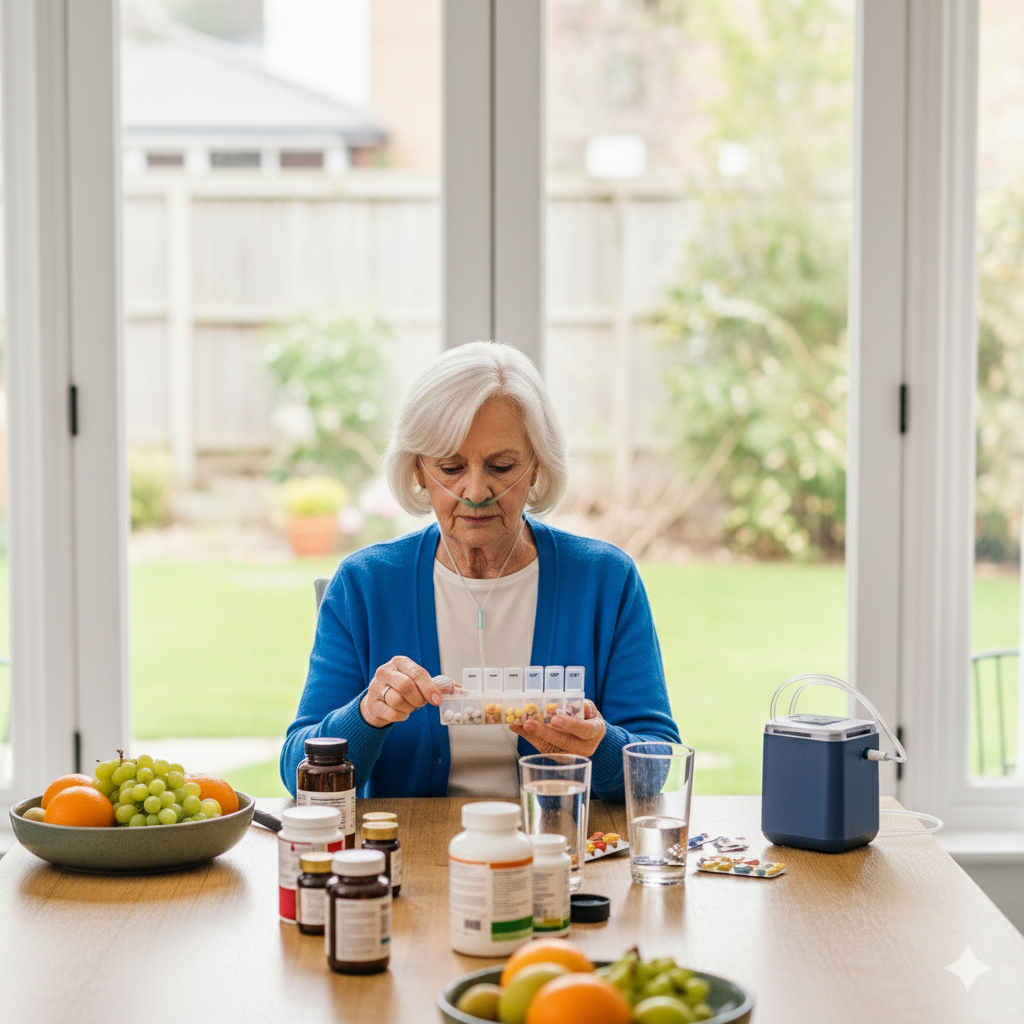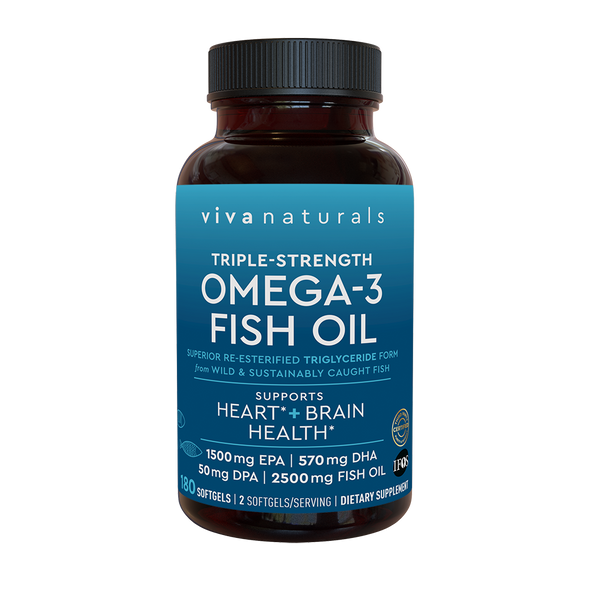
Best Vitamins and Supplements for People with COPD (2025 Guide)
Discover the best vitamins and supplements to support lung function, reduce inflammation, and prevent exacerbations for people with COPD in our comprehensive 2025 guide.
Take Control of Your COPD - Discover Tools Used by 50,000+ Patients. From daily oxygen monitoring to sleep-saving air purifiers, find the exact products your pulmonologist wishes you knew about. Every recommendation tested by real COPD patients.

Reduce inflammation and support heart health with premium omega-3 fish oil. High EPA/DHA content helps decrease inflammatory markers associated with COPD. Molecularly distilled for purity and potency.
COPD creates a constant state of inflammation that slowly destroys lung tissue. Omega-3 fatty acids EPA and DHA work like natural fire extinguishers, helping reduce the chronic inflammation that makes breathing harder every day. These essential fats can't reverse existing damage, but they may help slow progression and reduce exacerbation frequency.
"Since starting omega-3s six months ago, I haven't had a single COPD flare-up. My doctor was surprised at how stable my breathing tests have been." - David L., COPD Patient
Chronic Airway Inflammation: COPD triggers ongoing inflammation in your airways and lung tissue. This constant immune system activation damages healthy tissue and makes breathing progressively more difficult.
Inflammatory Cascade: Each breathing episode with COPD releases inflammatory molecules that call more immune cells to your lungs, creating a destructive cycle that worsens over time.
Oxidative Stress: Damaged lung tissue produces harmful free radicals that cause additional inflammation. This oxidative stress accelerates COPD progression and increases exacerbation risk.
Systemic Effects: COPD inflammation doesn't stay in your lungs - it affects your heart, muscles, and blood vessels, contributing to the fatigue and weakness many patients experience.
✅ EPA & DHA Power - Specific fatty acids that directly reduce inflammatory markers
✅ Specialized Pro-Resolving Mediators - Help resolve inflammation instead of just suppressing it
✅ Membrane Stabilization - Strengthen lung cell membranes against damage
✅ Immune System Modulation - Balance overactive immune responses in airways
✅ Cardiovascular Protection - Support heart health often compromised by COPD
✅ Muscle Preservation - Help prevent muscle wasting common in advanced COPD
Clinical Studies: Multiple research trials show omega-3 supplementation can reduce inflammatory markers, improve lung function tests, and decrease exacerbation frequency in COPD patients.
Inflammatory Marker Reduction: EPA and DHA supplementation significantly lowers C-reactive protein, IL-6, and TNF-alpha - key inflammation markers elevated in COPD.
Exacerbation Prevention: Some studies suggest regular omega-3 intake may reduce COPD flare-ups by 20-30% compared to placebo groups.
Quality of Life: Patients taking omega-3s often report improved energy levels, better exercise tolerance, and reduced shortness of breath during daily activities.
EPA vs DHA Ratios: Look for supplements with higher EPA content (at least 1000mg) as EPA shows stronger anti-inflammatory effects for respiratory conditions.
Molecular Distillation: Quality fish oil undergoes molecular distillation to remove mercury, PCBs, and other toxins that could worsen respiratory health.
Triglyceride Form: Natural triglyceride form absorbs better than cheaper ethyl ester forms, providing more therapeutic benefit per dose.
Third-Party Testing: IFOS (International Fish Oil Standards) certification ensures purity and potency verification from independent laboratories.
Quality omega-3 supplements with therapeutic doses cost about 50-80 cents per day. Compare this to the ongoing costs of managing inflammation-related health problems and frequent medical visits.
🐟 Find High-Quality Omega-3 Supplements (Look for EPA content over 1000mg per serving)
Therapeutic Dosing: Cheap fish oil often contains insufficient EPA/DHA amounts to achieve anti-inflammatory effects. Quality supplements provide 2-3 grams of active compounds per serving.
Purity Standards: Premium products remove toxins that could worsen respiratory health, while budget options may contain mercury and PCBs harmful to lung tissue.
Absorption Enhancement: Quality forms include absorption enhancers or use natural triglyceride forms that deliver more omega-3s to your tissues.
Stability Protection: Proper packaging and antioxidant additions prevent rancidity that can cause digestive upset and reduce therapeutic benefits.
Timing Strategy: Take omega-3s with meals containing healthy fats to enhance absorption and reduce potential digestive upset.
Dosage Guidelines: Start with 1-2 grams combined EPA/DHA and increase to 2-3 grams daily based on tolerance and inflammatory markers.
Form Selection: Choose triglyceride form fish oil or algae oil for vegetarians, avoiding cheaper ethyl ester forms with poor absorption.
Synergistic Support: Combine with vitamin E and other antioxidants to enhance anti-inflammatory effects and prevent omega-3 oxidation.
Resolvin Production: EPA and DHA convert to specialized pro-resolving mediators that actively resolve inflammation rather than just suppressing it.
Membrane Integration: Omega-3s incorporate into lung cell membranes, making them more resistant to inflammatory damage and oxidative stress.
Gene Expression: These fatty acids influence genes involved in inflammation, reducing production of inflammatory proteins and increasing anti-inflammatory compounds.
Immune Balance: Help shift immune system from pro-inflammatory state toward healing and tissue repair processes.
Fish Oil: Traditional source with extensive research backing, ideal for most COPD patients seeking anti-inflammatory support.
Algae Oil: Plant-based omega-3 source for vegetarians, environmentally sustainable with comparable EPA/DHA content.
Krill Oil: Contains phospholipid-bound omega-3s with potentially better absorption, plus astaxanthin antioxidant for additional protection.
Cod Liver Oil: Provides omega-3s plus vitamins A and D, beneficial for COPD patients with multiple nutritional deficiencies.
IFOS Certification: International Fish Oil Standards testing verifies purity, potency, and safety for therapeutic use.
EPA Content: Look for at least 1000mg EPA per serving, as this fatty acid shows strongest anti-inflammatory effects for respiratory conditions.
Freshness Indicators: Low peroxide and anisidine values indicate fresh, stable oil without rancidity that could cause digestive issues.
Clean Label: Avoid products with artificial colors, unnecessary fillers, or allergens that could trigger respiratory sensitivities.
Q: How long before I notice reduced inflammation?
A: Most patients report initial benefits within 4-6 weeks, with maximum anti-inflammatory effects developing after 2-3 months of consistent use.
Q: Can omega-3s replace my COPD anti-inflammatory medications?
A: No, omega-3s complement but don't replace prescribed COPD treatments. They provide additional anti-inflammatory support alongside conventional therapy.
Q: What about omega-3s from food vs. supplements?
A: While fatty fish is beneficial, achieving therapeutic doses (2-3g EPA/DHA daily) typically requires supplementation, especially for COPD patients with increased inflammatory needs.
Q: Are there any interactions with blood thinners?
A: Omega-3s can enhance anticoagulant effects. If taking warfarin or other blood thinners, work with your doctor to monitor and adjust dosing appropriately.
Ready to help cool the inflammatory fire that's damaging your lungs? Find quality omega-3 supplements today and discover why thousands of COPD patients consider these essential fatty acids crucial for managing chronic inflammation and reducing exacerbation frequency.
💡 Pro Tip: Ask your doctor to test inflammatory markers like C-reactive protein before starting omega-3s, then retest after 3 months to track improvement. Many COPD patients are surprised by the measurable reduction in inflammation levels.
Want Complete COPD Nutrition Guidance? Our comprehensive Best Vitamins and Supplements for People with COPD 2025 Guide covers omega-3s alongside other essential nutrients that work together for optimal respiratory health support.